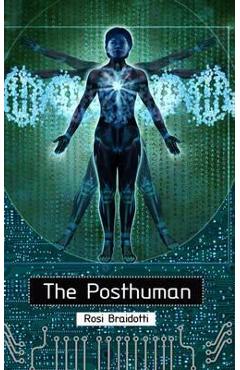Posthuman

Detalii Posthuman
libris.ro
114.68 Lei
127.42 Lei
Social Science
Rosi Braidotti
Posthuman - Disponibil la libris.ro
Pe YEO găsești Posthuman de la Rosi Braidotti, în categoria Social Science.
Indiferent de nevoile tale, Posthuman din categoria Social Science îți poate aduce un echilibru perfect între calitate și preț, cu avantaje practice și moderne.
Preț: 114.68 Lei
Caracteristicile produsului Posthuman
- Brand: Rosi Braidotti
- Categoria: Social Science
- Magazin: libris.ro
- Ultima actualizare: 28-10-2025 01:22:05
Comandă Posthuman Online, Simplu și Rapid
Prin intermediul platformei YEO, poți comanda Posthuman de la libris.ro rapid și în siguranță. Bucură-te de o experiență de cumpărături online optimizată și descoperă cele mai bune oferte actualizate constant.
Descriere magazin:
The Posthuman offers both an introduction and major contribution to contemporary debates on the posthuman. Digital \'second life\', genetically modified food, advanced prosthetics, robotics and reproductive technologies are familiar facets of our globally linked and technologically mediated societies. This has blurred the traditional distinction between the human and its others, exposing the non-naturalistic structure of the human. The Posthuman starts by exploring the extent to which a post-humanist move displaces the traditional humanistic unity of the subject. Rather than perceiving this situation as a loss of cognitive and moral self-mastery, Braidotti argues that the posthuman helps us make sense of our flexible and multiple identities. Braidotti then analyzes the escalating effects of post-anthropocentric thought, which encompass not only other species, but also the sustainability of our planet as a whole. Because contemporary market economies profit from the control and commodification of all that lives, they result in hybridization, erasing categorical distinctions between the human and other species, seeds, plants, animals and bacteria. These dislocations induced by globalized cultures and economies enable a critique of anthropocentrism, but how reliable are they as indicators of a sustainable future? The Posthuman concludes by considering the implications of these shifts for the institutional practice of the humanities. Braidotti outlines new forms of cosmopolitan neo-humanism that emerge from the spectrum of post-colonial and race studies, as well as gender analysis and environmentalism. The challenge of the posthuman condition consists in seizing the opportunities for new social bonding and community building, while pursuing sustainability and empowerment.

Produse asemănătoare

The Ethics of Generating Posthumans. Philosophical and Theological Reflections on Bringing New Persons into Existence, Hardback/***
![]() elefant.ro
elefant.ro
Actualizat in 28/10/2025
649.99 Lei

Being Posthuman. Ontologies of the Future, Hardback/Zahi Zalloua
![]() elefant.ro
elefant.ro
Actualizat in 28/10/2025
541.99 Lei

Posthuman Architecture. A Catalogue of Archetypes, Paperback/Jacopo Leveratto
![]() elefant.ro
elefant.ro
Actualizat in 28/10/2025
216.99 Lei

Curious Kin in Fictions of Posthuman Care, Hardback/***
![]() elefant.ro
elefant.ro
Actualizat in 28/10/2025
497.99 Lei
Produse marca Rosi Braidotti

Posthuman Knowledge and the Critical Posthumanities - Rosi Braidotti
![]() libris.ro
libris.ro
Actualizat in 28/10/2025
100.44 Lei

